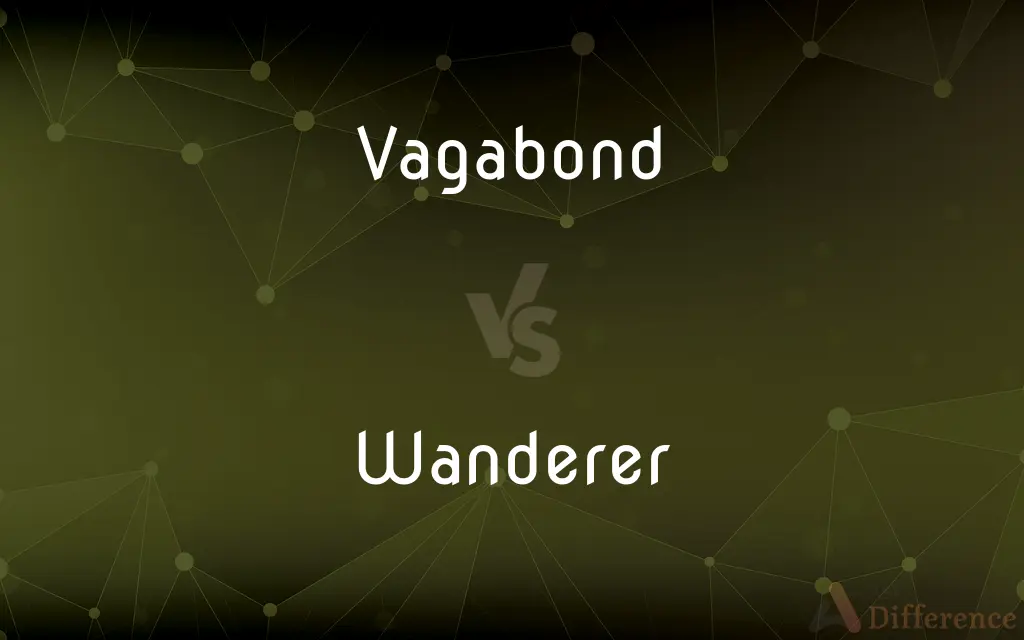Vagabond vs. Wanderer — What's the Difference?
By Fiza Rafique & Maham Liaqat — Updated on March 28, 2024
A vagabond lives a nomadic life out of necessity or choice, often seen as an outcast, while a wanderer travels for exploration or personal growth.

Difference Between Vagabond and Wanderer
Table of Contents
ADVERTISEMENT
Key Differences
Vagabonds are often perceived as individuals living a nomadic lifestyle, not by sheer choice but sometimes out of necessity, driven by circumstances or a deliberate rejection of societal norms. They are frequently associated with a lack of permanent home or employment, moving from place to place. Wanderers, on the other hand, embark on journeys more for the sake of exploration, adventure, or personal growth. They are not necessarily without a home or job but choose to travel as a way of life or to satisfy their curiosity about the world.
While vagabonds might be seen in a negative light, often stereotyped as drifters or societal outcasts, wanderers are usually viewed more positively, as individuals seeking knowledge, experiences, or spiritual fulfillment. This distinction highlights society's perceptions based on the reasons behind and the nature of their travels.
Vagabonds may rely on odd jobs, charity, or other transient means of support, reflecting their uncertain lifestyle. Wanderers, however, might have financial stability or savings that allow them to travel freely without the same pressures or constraints, showing the financial implications of their lifestyle choices.
Vagabonds have been romanticized in literature and history as free spirits rejecting societal constraints, but they also face challenges such as marginalization and lack of access to resources. Wanderers are often celebrated for their adventurous spirit, contributing to a more positive societal view and acceptance of their choice to explore and experience different cultures.
The legal status can also differ; vagabonds were historically subject to laws against vagrancy, reflecting societal attempts to control or penalize their way of life. Wanderers, while still subject to laws and regulations, typically navigate these with more ease, planning their travels within the bounds of societal norms and legal frameworks.
ADVERTISEMENT
Comparison Chart
Definition
Nomadic lifestyle often out of necessity, associated with lack of permanent home.
Travels for exploration, personal growth, not necessarily without a home.
Perception
Often seen as outcasts or drifters.
Viewed positively, as seekers of adventure or knowledge.
Economic status
Relies on transient means of support.
May have financial stability or savings for travel.
Cultural impact
Romanticized but faced with marginalization.
Celebrated for adventurous spirit, contributes to cultural exchange.
Legal status
Subject to vagrancy laws historically.
Navigates legal frameworks with ease, planning travels accordingly.
Compare with Definitions
Vagabond
Someone who rejects societal norms and chooses a nomadic life.
He became a vagabond, rejecting the corporate world for freedom.
Wanderer
Not necessarily without a home, but chooses to explore.
Despite having a home, he was a wanderer, exploring the world whenever he could.
Vagabond
Living a life characterized by moving frequently.
Her vagabond lifestyle made it difficult to maintain long-term relationships.
Wanderer
Viewed more positively, as an explorer or adventurer.
As a wanderer, she was admired for her courage and adventurous spirit.
Vagabond
A lifestyle or choice driven by necessity or desire for freedom.
The economic downturn forced many into a vagabond way of life.
Wanderer
A person who travels aimlessly or for pleasure.
The wanderer took to the road, seeking new experiences in distant lands.
Vagabond
Often seen with a negative connotation, associated with aimlessness.
Society viewed him as a vagabond, aimless and unproductive.
Wanderer
Embodies freedom of movement and curiosity.
The wanderer’s spirit was fueled by curiosity and a love for the unknown.
Vagabond
A person who wanders from place to place without a home or job.
The vagabond moved from town to town, sleeping wherever he could find shelter.
Wanderer
Often driven by a desire for personal growth or adventure.
She was a wanderer at heart, always looking for the next adventure.
Vagabond
A person who moves from place to place without a permanent home and often without a regular means of support.
Wanderer
To move about without a definite destination or purpose.
Vagabond
Of, relating to, or characteristic of a vagabond.
Wanderer
To go by an indirect route or at no set pace; amble
We wandered toward town.
Vagabond
To wander or travel about, especially as a vagabond.
Wanderer
To proceed in an irregular course; meander
The path wanders through the park.
Vagabond
A person on a trip of indeterminate destination and/or length of time.
Wanderer
To behave in a manner that does not conform to morality or norms
Wander from the path of righteousness.
Vagabond
One who usually wanders from place to place, having no fixed dwelling, or not abiding in it, and usually without the means of honest livelihood.
Wanderer
To turn the attention from one subject to another with little clarity or coherence of thought
I had a point to make, but my mind started wandering.
Vagabond
To roam, as a vagabond
Wanderer
To be directed without an object or in various directions
His eyes wandered to the balcony.
Vagabond
Floating about without any certain direction; driven to and fro.
Wanderer
To wander across or through
Wander the forests and fields.
Vagabond
Moving from place to place without a settled habitation; wandering.
Wanderer
To be directed around or over
Her gaze wandered the docks.
Vagabond
Floating about without any certain direction; driven to and fro.
To heaven their prayersFlew up, nor missed the way, by envious windsBlown vagabond or frustrate.
Wanderer
The act or an instance of wandering.
Vagabond
Being a vagabond; strolling and idle or vicious.
Wanderer
One who wanders, who travels aimlessly.
Vagabond
One who wanders from place to place, having no fixed dwelling, or not abiding in it, and usually without the means of honest livelihood; a vagrant; a tramp; hence, a worthless person; a rascal.
A fugitive and a vagabond shalt thou be.
Wanderer
Any of various far-migrating nymphalid butterflies of the genus Danaus.
Vagabond
To play the vagabond; to wander like a vagabond; to stroll.
On every part my vagabonding sightDid cast, and drown mine eyes in sweet delight.
Wanderer
(colloquial) The wandering albatross, Diomedea exulans.
Vagabond
Anything that resembles a vagabond in having no fixed place;
Pirate ships were vagabonds of the sea
Wanderer
One who wanders; a rambler; one who roves; hence, one who deviates from duty.
Vagabond
A wanderer who has no established residence or visible means of support
Wanderer
Someone who leads a wandering unsettled life
Vagabond
Move about aimlessly or without any destination, often in search of food or employment;
The gypsies roamed the woods
Roving vagabonds
The wandering Jew
The cattle roam across the prairie
The laborers drift from one town to the next
They rolled from town to town
Wanderer
A computer program that prowls the internet looking for publicly accessible resources that can be added to a database; the database can then be searched with a search engine
Vagabond
Wandering aimlessly without ties to a place or community;
Led a vagabond life
A rootless wanderer
Vagabond
Continually changing especially as from one abode or occupation to another;
A drifting double-dealer
The floating population
Vagrant hippies of the sixties
Common Curiosities
Can wanderers have a permanent home?
Yes, wanderers can have a permanent home but choose to travel extensively out of a desire for exploration or adventure.
How do vagabonds support themselves?
Vagabonds may support themselves through odd jobs, charity, or other means suitable for a transient lifestyle.
What drives a person to become a wanderer?
Wanderers are often driven by a desire for adventure, exploration, personal growth, or curiosity about the world.
How do societies perceive vagabonds?
Vagabonds are often perceived negatively, as drifters or societal outcasts, due to their nomadic and unstable lifestyle.
What legal challenges can vagabonds face?
Historically, vagabonds faced legal challenges such as laws against vagrancy, reflecting societal attempts to control their way of life.
How do wanderers plan their travels?
Wanderers may plan their travels based on interests, adventure, personal growth opportunities, or even spontaneously.
What is a vagabond?
A vagabond is someone who lives a nomadic lifestyle, often without a permanent home or job, moving from place to place.
Why might someone choose a vagabond lifestyle?
People might choose a vagabond lifestyle out of necessity, a desire for freedom, or a rejection of societal norms and expectations.
Are wanderers always traveling alone?
No, wanderers can travel alone or with others; their defining trait is their aim to explore and experience new places.
Do wanderers contribute to the places they visit?
Yes, wanderers can contribute through cultural exchange, spending in local economies, and sometimes volunteer work.
Is being a vagabond a choice or a necessity?
It can be either; some choose the lifestyle for freedom, while others are driven to it by economic or social circumstances.
What distinguishes a wanderer from a tourist?
Wanderers seek personal growth and experiences beyond traditional tourism, often traveling more deeply or aimlessly.
Can a vagabond lifestyle be sustainable?
Sustainability depends on the individual's adaptability and the resources they can access; it can be challenging but not impossible.
What motivates a wanderer's choice of destination?
Motivations can include cultural interest, natural beauty, adventure, personal connections, or even spiritual quests.
How has the digital age affected the vagabond and wanderer lifestyles?
The digital age has made information more accessible, enabling better planning and connectivity, and sometimes even remote work opportunities for both lifestyles.
Share Your Discovery

Previous Comparison
Get vs. Make
Next Comparison
Matrix vs. TableAuthor Spotlight
Written by
Fiza RafiqueFiza Rafique is a skilled content writer at AskDifference.com, where she meticulously refines and enhances written pieces. Drawing from her vast editorial expertise, Fiza ensures clarity, accuracy, and precision in every article. Passionate about language, she continually seeks to elevate the quality of content for readers worldwide.
Co-written by
Maham Liaqat















































